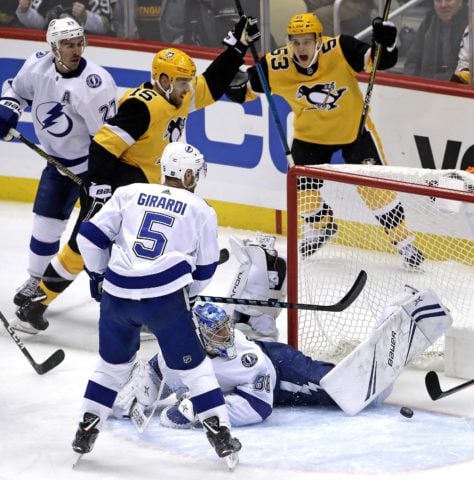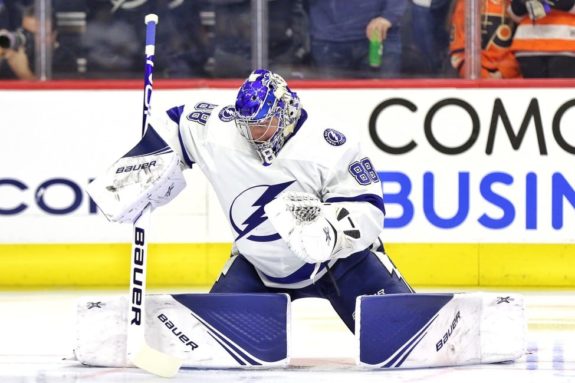The Stanley Cup Playoffs are a long, grinding road designed to test the limits of patience, pain, and fatigue. That is why no team since the 1985 Edmonton Oilers has appeared in three consecutive Stanley Cup Finals. The Tampa Bay Lightning are looking to join that list and may find that fatigue might be their most difficult obstacle in reaching that goal.
Players will tell you that fatigue is not a factor, no matter how many games they have played in recent years. “We love playing big games” and “You never get tired of hockey,” are phrases that get tossed out in interviews quite a bit. The truth is, that physical and mental fatigue does factor into a long playoff run.
Recent Cup Champions Did Suffer Some Fatigue Issues
The Pittsburgh Penguins were Stanley Cup champions in 2016 and 2017. During their run for a three-peat, they had reached their 60th playoff game over that three-year stretch. That means that in less than three years, the Penguins had played an extra 73 percent of a full season in playoff games. It is also generally understood that playoff games far outpace regular-season games in both physicality and intensity. Former NBC analyst and Chicago Blackhawks star Jeremy Roenick noted how fatigue had affected the Penguins’ play. “It definitely takes a toll. There’s no question. You can’t play as long as they have and take the punishment that they have for three seasons and not have it catch up to you at some point.” (Kilgore, Adam. “Penguins Dismiss Fatigue Factor After 59 Playoff Games in Three Season.” Washington Post, 5/4/18)
The fatigue sometimes is more mental than physical. Former Penguins defenseman Brooks Orpik was quoted as saying that mental fatigue plays a factor more than the actual physical fatigue, as players train so well and are in very good physical condition. When the Penguins were eliminated by the Washington Capitals in the 2018 Playoffs, the reasons for their losses were poor puck management, lapses in coverage, bad changes, and ugly giveaways. Many felt that the Penguins look tired and skated tired, as well as making the above-mentioned mistakes that could be explained by mental fatigue.

The Chicago Blackhawks won three Stanley Cup Championships from 2010 to 2015. In the years in which they did not win the Cup, they did make some deep playoff runs, resulting in many of the core players playing quite a few games during that span.
Lightning fans know that the Blackhawks defeated their Lightning in the 2015 Cup Final. What they may not remember was that the Blackhawks almost did not make it there, as they had trailed the Anaheim Ducks 3-2 before pulling out the last two games of the series. In the first five games, fatigue was cited as a factor for the Blackhawks falling behind. Veteran coach Claude Noel said of their play: “Clearly fatigue has set into the series. What happens when a team is fatigued and tired is you begin to be late everywhere. There’s not much of a forecheck, you turn the puck over, you’re late for puck races, there’s bad execution and players can’t find each other because they don’t work hard enough to get open. Sounds very similar to some of the issues the Lightning have experienced this season.”
After the 2015 season, Niklas Hjalmarsson was quoted in the book If These Walls Could Talk: Chicago Blackhawks as saying that he was pretty tired after playing 275 hockey games in less than 30 months, including 11 playoff series in three seasons. It showed during the regular season as the Hawks only finished third in the Western Conference. Publically, they downplayed the fatigue factor, but privately they knew that the playoff run would drain them of almost every ounce of physical and emotional energy that they had.
It seems very similar to what the Lightning experienced in the recent playoff series, as the Blackhawks went through some rough stretches in the 2015 Cup Final. The Blackhawks played sloppy in the Game 4 loss to the Lightning. A team that averaged only 4.12 giveaways per game during the regular season had 16. Breakouts were disorganized and they missed routine passes. These mistakes can be attributed to mental fatigue. Much like they recently did in the Toronto series, the Blackhawks were able to overcome these issues to win the next two games.
Can the Lightning Overcome Fatigue?
There is enough evidence that the Lightning are dealing with a little more than average end-of-the-season fatigue. Back in April, TNT analyst Rick Tocchet noted that goaltender Andrei Vasilevskiy and some of their core players looked tired. This would certainly explain why at times during the regular season, they looked and played very indifferently, as, during one stretch in March, they went 1-9-1 against playoff teams. Vasilevskiy himself has played a lot since the beginning of the 2019-20 season, appearing in 201 regular season and playoff games. He also played every minute of the last two playoffs. They have tried to manage his workload by giving him time off from some practices and strategically resting him in favor of backup Brian Elliot, but that doesn’t negate the fact that Vasilevskiy and his teammates have played a lot of hockey in the past couple of years.

Also, the Lightning have had to deal with something that neither the Blackhawks nor the Penguins had to: a worldwide pandemic. Both the 2020 and 2021 seasons were altered. Although this led to a reduction in games, it forced games inside bubbles, while players dealt with vaccinations, daily testing, and other concerns associated with it. Even as it continues to wind down, teams traveling in and out of Canada are still facing regulations regarding this situation. NHL players have also not been exempt from the mental toll caused by it.
There is clearly enough evidence to show that the Lightning are suffering from a bit more fatigue than your average NHL team at this point in the year. To answer the question, we need to take a look at how they have dealt with this within the last couple of months. When they have been successful during this time, they stepped up their defense and played more physically and with some extra grit. In other words, they do what champions do. When they are down, they bounce back, maybe as good as any team in recent memory. When they needed to, they had the will to win, more than their opponents. They have been able to harness some mental focus and give whatever they have left in their tank to maximum effort.
Related: 3 Lightning Players Who Need to Produce in the 2022 Playoffs
If fatigue is an issue, can the Lightning overcome it? They have so far. But only time will tell if they can deal with this issue enough to win a third-straight Stanley Cup.